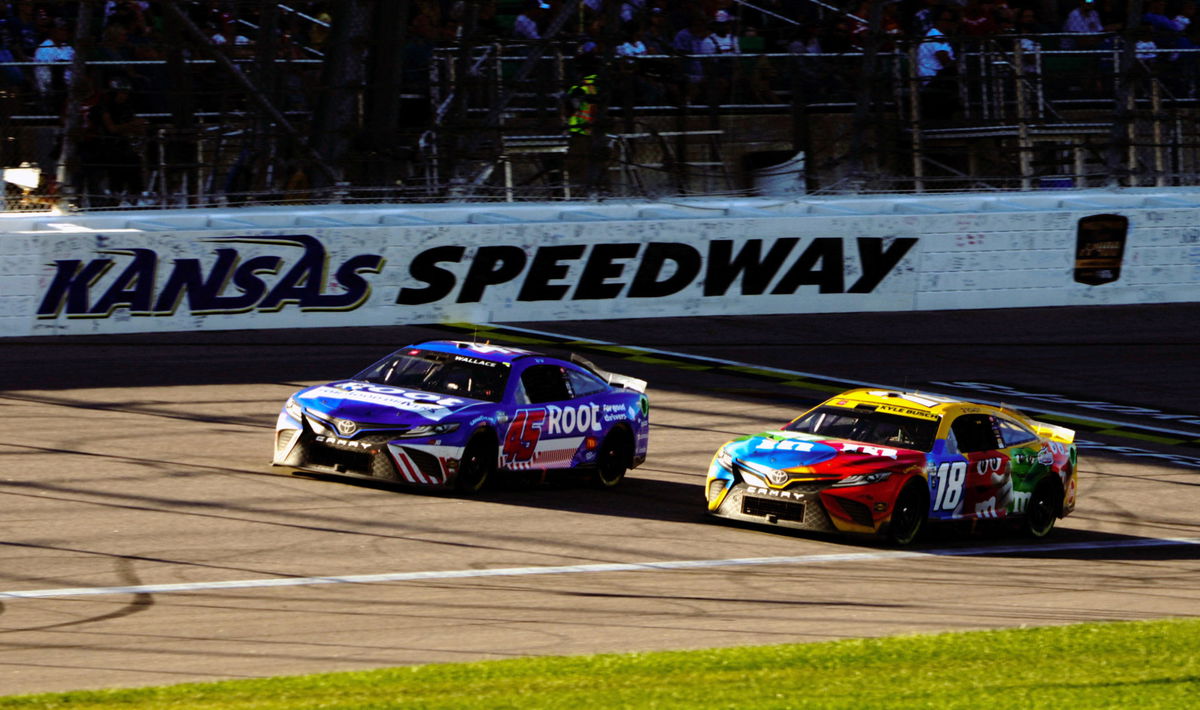
USA Today via Reuters
Sep 11, 2022; Kansas City, Kansas, USA; NASCAR Cup Series driver Bubba Wallace (45) leads driver Kyle Busch (18) during the Hollywood Casino 400 at Kansas Speedway. Mandatory Credit: Jay Biggerstaff-USA TODAY Sports

USA Today via Reuters
Sep 11, 2022; Kansas City, Kansas, USA; NASCAR Cup Series driver Bubba Wallace (45) leads driver Kyle Busch (18) during the Hollywood Casino 400 at Kansas Speedway. Mandatory Credit: Jay Biggerstaff-USA TODAY Sports
Kansas Speedway might not have the decades-long prestige of Daytona or the raw chaos of Talladega. But in just over 20 years, it’s carved out a reputation for delivering drama on demand. Since its inaugural NASCAR Cup race in 2001, won by none other than Jeff Gordon, the 1.5-mile tri-oval has been home to nail-biters, upsets, and photo finishes that still have fans talking. Whether it was Joey Logano muscling his way into the Championship 4 in 2020 or Kyle Larson’s absurdly close 0.001-second win in 2024, Kansas has a way of sneaking up on you and stealing the show.
Watch What’s Trending Now!
Once considered just another intermediate track, Kansas has quietly become one of NASCAR’s most consistent storytellers. And now, as whispers grow louder in the garage and boardrooms alike, this underdog oval might be gearing up for something even bigger.
Kansas Speedway is no longer just a stop on NASCAR’s calendar
Kansas Speedway hosts two Cup Series races each season and has earned a reputation for delivering unpredictable, action-packed racing. But now, the track is quietly positioning itself for even greater prominence. Industry insiders and local leaders are hinting at the possibility of Kansas landing a coveted third NASCAR Cup Series event shortly.
This speculation comes at a pivotal time for the sport. NASCAR recently announced it will rotate its championship weekend among various tracks starting in 2027, following the 2026 finale at Homestead-Miami Speedway. For over two decades, the championship race has been limited to just two venues. Homestead-Miami and Phoenix Raceway. Homestead was at the helm for the bulk of the 21st century until Phoenix took the reins in 2020. The new model is designed to boost fan engagement and bring the season’s biggest spotlight to different markets after Phoenix’s predictable results in the last three years with Team Penske winning all three championships. And Kansas Speedway is one of the frontrunners.
Pat Warren, Kansas Speedway’s longtime president, believes the track’s 1.5-mile layout could be the perfect fit for a Championship race. He echoes what many insiders have been quietly suggesting. What’s more? Warren hinted that surrounding development in the area, particularly a new Buc-ee’s being built nearby, might catch the eye of NASCAR’s decision-makers. Moreover, the exciting races that Kansas has produced only strengthen its case further. In Warren’s words, “The racing we’ve had could put us in the mix for that kind of discussion.”
.@KansasSpeedway prez Pat Warren “believes KCK’s 1.5-mile track length appeals to a championship setting. He also said nearby development could pique [Ben] Kennedy’s interest, including the forthcoming Bucee’s location.” – @Fox4KC https://t.co/dWVghS65gL
— Adam Stern (@A_S12) May 14, 2025
Drivers are already voicing their support for Kansas Speedway’s potential expanded role. Ross Chastain recently said, “I’d love it. This place would put on a great race. This facility would more than welcome the crowd that would come out for that. The surrounding area would support it.” His enthusiasm for Kansas is echoed by fellow competitors like Denny Hamlin. Hamlin, in his Actions Detrimental podcast, said last year, “If you were to design a mile and a half nowadays, it would be like give me whatever Kansas has got.” Chastain and Hamlin have both been successful at Kansas, too. Ross won the fall playoff race in 2024, while Hamlin is a 4-time winner at the track.
As NASCAR looks to the future and embraces a rotating championship model, Kansas Speedway’s blend of racing excitement, fan engagement, and logistical advantages could make it a linchpin in the sport’s evolving landscape. Whether or not a third Cup race or a championship finale materializes, one thing is clear. Kansas is ready for a bigger role, and the rest of the NASCAR world is starting to take notice.
A strategic shift to revitalize the Finale by NASCAR
NASCAR’s announcement to rotate its championship race among different tracks starting in 2026 marks a bold departure from tradition. It reflects a strategic effort to breathe new life into the sport’s season-ending spectacle. For over two decades, the championship had been locked to just two venues, Homestead-Miami Speedway and Phoenix Raceway, offering consistency but also predictability that some fans and insiders felt limited excitement.
One of the primary reasons behind this shift is to create a “big-event feel” akin to marquee sporting events like the Super Bowl or NBA All-Star Game, which move locations annually to generate fresh enthusiasm and anticipation. By rotating the finale, NASCAR aims to tap into new regional markets, energize local fan bases, and build pent-up demand that can translate into higher attendance and viewership. Another crucial factor is competitive variety.
NASCAR’s diverse track portfolio means that each venue presents unique challenges. NASCAR’s varied venues have differences in everything, from track length and banking to surface and racing style. Rotating the championship forces teams and drivers to adapt, preventing any single driver or team from gaining a prolonged advantage tied to one track. This unpredictability enhances the drama and fairness of the championship battle, making the title fight more compelling for fans.
The decision also responds to feedback from the NASCAR community, including fans, teams, broadcasters, and sponsors, who have long expressed a desire for more variety and fairness in the playoff system. By spreading the championship across different tracks, NASCAR hopes to showcase the sport’s breadth and keep the competition fresh year after year. Kevin Harvick voiced his view on the rotating championship back in 2024, saying, “I hope at some point we start cycling these championship races of Phoenix to Homestead, even if it’s just those two racetracks… If you had three, do you need more than three in that rotation? If you had Las Vegas, Phoenix, Homestead that rotated that championship race, every three years, you went to those locations.”
Importantly, NASCAR has ruled out certain venues from the rotation. For example, Daytona International Speedway will not host the finale. The reasoning is that superspeedway racing’s inherent unpredictability, where big wrecks and drafting can heavily influence outcomes, doesn’t align with the goal of crowning a champion based on consistent, skillful racing and strategy.
Rotating the championship venue is NASCAR’s way of evolving with the times-injecting excitement, fairness, and broader fan engagement into the sport’s most critical weekend. It’s a calculated move to ensure the finale remains a must-watch event.
What do you think of Kansas Speedway potentially joining the Championship rotation? Let us know in the comments!






